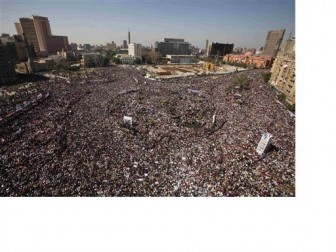CAIRO, (Reuters) – Millions took to the streets to celebrate the new Egypt today, reminding military rulers to keep their promise of a swift transition to civilian rule after people power swept away autocrat Hosni Mubarak in just 18 days.
On an emotional day that will become a landmark in modern Egyptian history and a memorial to the 365 people who died in the uprising, many said they would carefully guard newly-won promises from the military of elections within six months.
“This is a serious message to the military,” said Mohamed el-Said, 28, who travelled to Cairo from Port Said, gesturing to the colourful sea of people from all walks of life around him who rallied to mark the stepping down of Mubarak a week ago.

“After today, it will be more than obvious to them that if they don’t protect the revolution and respond to the people’s demands, the next time people go down to Tahrir won’t be to celebrate victory, but they will bring their blankets with them like before,” he told Reuters in Tahrir (Liberation) Square.
Sheikh Yousef al-Qaradawi, an influential Qatar-based Egyptian preacher, told worshippers in Tahrir Square that fear had been lifted from Egyptians who had toppled a modern pharaoh through faith and triumphed over sectarianism.
His appearance and the emergence of the Muslim Brotherhood show a new-found acceptance in the new Egypt of once-forbidden Islamist movements, although Egyptians say religious voices are only some of the many now being heard.
The revolution in Egypt, a U.S. ally which signed the first Arab peace treaty with Israel, sent tremors through the region. Protests erupted in Libya, Yemen, Bahrain, Iran and Iraq, taking their cue from Egypt and Tunisia who toppled their leaders.
“I call on the Egyptian army to liberate us from the government that Mubarak formed,” Qaradawi told the faithful at noon prayers in Tahrir Square, after which the crowd exploded with cheers and waved national flags in jubilation.
The cabinet now in place is largely the same as one that Mubarak, 82, appointed shortly before he stepped down from the presidency. A reshuffle is expected in the next few days.
RESHUFFLE EXPECTED
Security officials said Prime Minister Ahmed Shafiq would announce ministers making up the new emergency government next week and hoped the reshuffle at the top would help to appease protesters and workers on strike.
Life in Egypt is still far from normal a week after Mubarak’s exit, with tanks on the streets, banks and schools closed, workers on strike and further anti-government protests.
There were tanks and armoured vehicles at the entrances to the sprawling square, which was packed tightly with marchers, bowing simultaneously in prayer joined by red-bereted military police and other uniformed soldiers guarding the area.
Soldiers handed out national flags while a military band played “Egypt My Love” and marchers took photographs of themselves and their families smiling with tank crews alongside their armoured vehicles. People on the banks of the Nile River that runs through Cairo danced and banged drums.
About 5,000 people gathered peacefully in another part of Cairo, Mohandisseen, chanting slogans of gratitude to Mubarak and apologies for the way in which he was deposed, saying they supported revolution but objected to Mubarak’s treatment.
“The people want to honour the president,” they chanted, dressed in black as a signal of remorse about the ailing Mubarak, who is in the Red Sea resort of Sharm el-Sheikh. Banners at the rally said, “Yes to change, no to humiliation.”
“GUARD THE REVOLUTION”
The Muslim Brotherhood, which says it is committed to democracy, is seen as the only truly organised bloc in Egypt and believes it could win up to 30 percent of votes in an election. The Brotherhood also warned of the need to protect gains.
“We urge all noble people … to guard the revolution and its legitimate demands, and not to leave the chance for opportunists to kidnap it and its accomplishments which, with God’s permission, have begun to bear fruit,” said the Brotherhood’s leader Mohamed Badie, just ahead of the march.
“This is an Egypt that cannot be deceived,” Badie said in his Friday message to followers on the Brotherhood’s website.
Egypt’s official state news agency, which before Mubarak’s downfall had largely ignored or played down protests, said on Friday that more than 2 million people were in Tahrir Square.
Such a popular outpouring of emotion was on a par with the 1970 death of President Gamal Abdel Nasser, whose speeches gripped and galvanised the Arab world, when mourners flooded the streets of Cairo and Egyptian cities.

